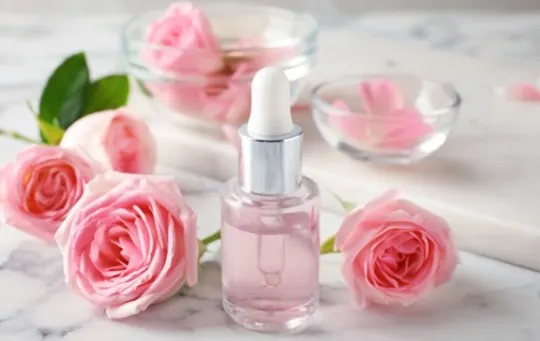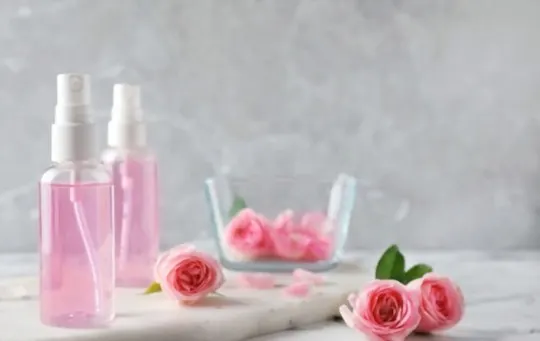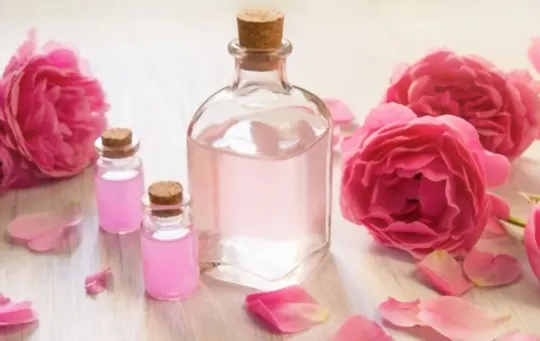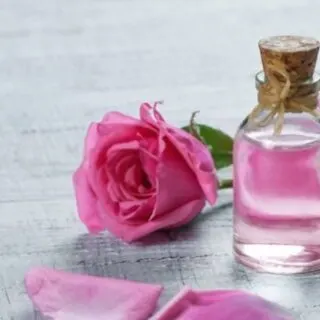If you’ve heard of rose water, then you probably know that it has a unique flavor.
But what exactly does rose water taste like?
Well, this comprehensive guide will answer all your questions regarding the distinctive taste and aroma of rose water.
You may have tried different flavored syrups or experienced the delicate scent of roses in perfumes.
However you won’t get an accurate impression of what rose water actually tastes like until you try it for yourself!
Here we discuss its unique character, any alternate flavors associated with it, and helpful tips on how to better appreciate its fascinatingly complex flavor profile.
What is Rose Water?

Rose water is a flavoured liquid that is made from rose petals and water.
It is known for its sweet fragrance, and it has been used in cooking and cosmetics for centuries.
This fragrant liquid can be used as a flavouring agent in desserts or as a key ingredient in several beauty products.
The process of making rose water involves steeping fresh or dried rose petals in distilled water overnight to extract the fragrance and flavour.
The petals are then strained out, leaving behind a clear liquid that has the delicate aroma of fresh roses.
The concentration of this liquid varies depending on how long the petals have soaked.
Rose water has many uses, ranging from culinary to medicinal.
In cooking, it is commonly used to give traditional Middle Eastern dishes such as baklava and Turkish delight their distinctive taste.
It is also found in many desserts like cakes, mithai, kulfi falooda and sherbet as an added flavouring ingredient.
When it comes to medicine or cosmetic purposes, rose water is widely used due to its antiseptic properties.
It helps soothe skin irritation and treat mild sunburns or rashes.
Rose water can also be used as an acne treatment because it helps control excess oil production on the skin’s surface.
Overall, rosewater has been widely accepted by people around the world due to its pleasing aroma and versatility of usage.
Its gentle nature makes it suitable for any kind of skin type or cuisine preference.
What Does Rose Water Taste Like?

Rose water is a versatile ingredient that has been used in cosmetics, perfumes, and even culinary dishes for centuries.
But one question that may come to mind when it comes to this fragrant liquid is: what does rose water taste like?
When it comes to taste, rose water has a unique sweetness that is not overwhelming.
It has a floral flavor with subtle notes of honey, which makes it an ideal addition to many desserts and beverages.
The taste of rose water can also be slightly acidic, but this depends on the concentration and quality of the product.
Some varieties may include added sugar or preservatives, which can alter the taste.
If you’re familiar with Middle Eastern or Indian cuisine, you may have tasted rose water before in dishes like baklava or lassi.
In these recipes, rose water enhances other flavors and adds a delicate touch of aroma.
In general, when using rose water in cooking, it’s important to use it sparingly as its flavor can easily overpower other ingredients.
It’s best to start with small amounts and adjust as needed.
Culinary Uses of Rose Water
Rose water has been used in cooking for centuries and has a long history in Middle Eastern, Indian, and Chinese cuisines.
It is a versatile ingredient that can be used in both sweet and savory dishes.
In savory recipes, it is often used to add a floral aroma to meat dishes like chicken or lamb.
It can also be added to rice dishes or vegetable stir-fries for extra flavor.
In sweet recipes, rose water is widely used in desserts such as cakes, cookies, and pastries.
It lends a subtle floral taste that pairs well with vanilla or almond flavors.
Rose water can also be used to make fruit salads or refreshing drinks like lemonade or iced tea.
When using rose water in cooking, it is important to use it sparingly as its flavor can easily overpower other ingredients.
Start with a small amount and adjust according to taste.
A little goes a long way when it comes to rose water.
For those who are unfamiliar with the taste of rose water, it can be described as delicate and slightly sweet with a distinct floral aroma that lingers on the palate.
Its flavor profile complements many different ingredients making it a popular choice among chefs and cooks.
Overall, with its versatility and unique flavor profile, rose water is an excellent ingredient to experiment within the kitchen.
Incorporating rose water into your dishes may seem daunting at first but with practice, it can become an essential part of your culinary repertoire.
In the next heading we will explore different ways to incorporate this fragrant ingredient into your cooking and baking.
How to Use Rose Water in Cooking and Baking?

Using rose water in cooking and baking is a great way to add a unique floral flavor and aroma to your dishes.
Here are six ways you can incorporate rose water into your culinary creations:
- Add a few drops of rose water to sugar syrup for baklava or other Middle Eastern desserts.
- Use rose water in place of vanilla extract in recipes like shortbread cookies or rice pudding.
- Mix rose water with honey and drizzle it over fresh fruit for a refreshing dessert.
- Add a splash of rose water to hot cocoa or coffee for an unexpected twist on your morning drink.
- Use rose water as the soaking liquid when making sponge cake or ladyfingers for a floral twist on classic desserts like tiramisu.
- Combine rose water with cream cheese, powdered sugar, and vanilla extract for a sweet and tangy frosting that pairs well with light cakes like angel food cake or lemon cake.
By using rose water in these ways, you can bring new flavors and textures into your cooking and baking.
So don’t be afraid to experiment with this aromatic ingredient.
When using rose water in cooking, it’s important to remember that a little goes a long way.
Start with just a small amount – no more than half a teaspoon – and taste as you go.
You want the flavor of the roses to be present but not overpowering.
Another thing to keep in mind is that while many cultures use rose water in their traditional dishes, it may not be as common where you live.
If you’re unsure about how much to use or how it will affect the final taste of your recipe, start by adding just a drop at first and then work upwards from there.
Overall, using rose water is an easy way to add some unique fragrant flavors to your dishes.
Whether you’re experimenting with new ingredients or trying out old favorites with a new twist, using rose water can add a delightful touch to your culinary creations.
Where to Buy Rose Water and How to Store It?

To get your hands on rose water and learn how to store it correctly, there are a few things you should keep in mind.
You can typically find rose water in specialty stores that sell exotic ingredients or health food stores with a focus on organic products.
Alternatively, you could check online for retailers that sell rose water.
Once you have purchased your rose water, it’s important to store it properly to ensure it retains its quality and fragrance.
Keep the bottle tightly sealed and store it in a cool, dark place away from direct sunlight.
Rose water has a relatively long shelf life and can last for up to one year if stored correctly.
In terms of using rose water in food and drink recipes, remember that a little goes a long way.
You don’t want the flavor of rose to overpower other elements in your dish or drink.
Start with small amounts and increase as needed based on taste preference.
Overall, buying and storing rose water is fairly straightforward.
Just make sure to find a reputable retailer and keep the bottle tightly sealed in a cool, dark place for optimal freshness.
Conclusion
Now that you know what Rose Water is and where to buy it, the question arises- how should you store it? The good news is that Rose Water has a long shelf life if stored properly.
You can keep it in an airtight container away from heat and sunlight.
It is important to note that Rose Water can lose its fragrance over time, especially if exposed to air or moisture.
Therefore, it’s best to use freshly bought Rose Water within six months.

What Does Rose Water Taste Like? A Comprehensive Guide
Ingredients
- Rose water
- Ingredients from your selected recipes
Instructions
- Select ingredients that work well together.
- Use a recipe or method that will enhance their natural taste.
- Taste and adjust the recipe as needed to achieve the desired flavor.

Carrie is a food writer and editor with more than 15 years of experience. She has worked for some of the biggest names in the food industry, including Bon Appétit, Food & Wine, and Martha Stewart Living.
As the Editor in Chief of IntroChicago.com, Carrie oversees all of the content on the site. She also manages the team of contributing writers and editors, who help to create delicious recipes, helpful tips, and informative articles that you’ll find on the site.
A native of the Chicago area, Carrie is passionate about all things food. She loves trying new restaurants and experimenting with new recipes in her kitchen. She’s also a graduate of the Culinary Institute of America, so she knows a thing or two about food!
